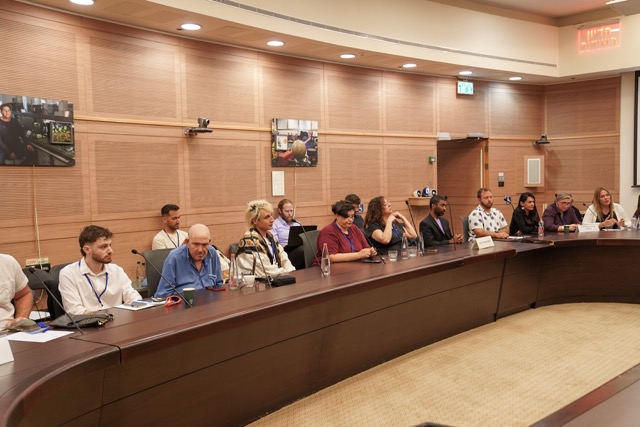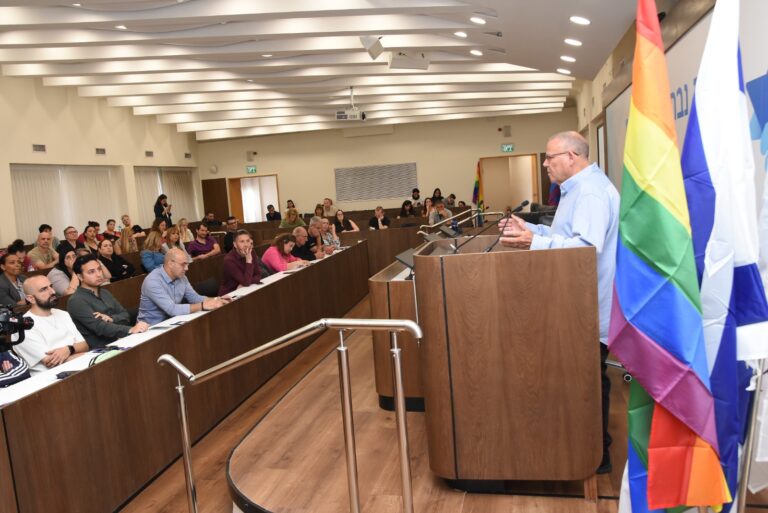
The Youth Affairs Committee held a special discussion on Tuesday July 4 about solutions for LGBTQ+ discrimination in workplaces, in light of International LGBTQ+ Day on June 28. Labor MK and committee chair Naama Lazimi spoke at the beginning of the discussion, and mentioned the case published in Davar of a young transgender man who was refused a job by the pharmacy chain SuperPharm due to his gender identity.
"Unfortunately, we have a government that is taking us backwards in matters of acceptance of diversity,” she said. “We are witnessing a disturbing increase in hate crimes against the community, and we have to take steps towards a safe space in the workplace as well. Legitimizing queerphobia is a backwards mindset. This is a fight for human rights."
"In the last thirty years, not a single law has been enacted in the Knesset in support of the queer community; the Knesset is not performing its duty towards the community,” MK Lazimi added.
She explained that the proposed judicial reform’s threat to the power of the Israeli supreme court adds stress to the situation, since the court has often backed the LGBTQ+ community against institutionalized discrimination.
The Central Bureau of Statistics does not collect data on LGBTQ+ employment
Shachar Grembek, chairman and founder of the LGBTECH organization which promotes equality for queer acceptance in the labor market in Israel, presented a survey on workforce discrimination. It showed that 18% of the members of the community experience queerphobia in the workplace, and that about a third of the community remains in the closet in their work environments for fear that it may harm their employment.
Dr. Sigal Goldin, head of the Israeli Institute for Gender and LGBT Studies, which assisted in LGBTECH's survey, added that the Central Bureau of Statistics (CBS) does not collect data regarding LGBTQ+ people and the employment market.
She reported that between 8-12% of people aged 18 and older in Israel identify as LGBTQ+, meaning “around 560,000 people who are or will potentially be in the employment market.”
“This has a decisive effect on the productivity of the State of Israel,” Goldin continued. “But we have no data. This field is still very scarce. It's time we stop guessing and make it a priority."
Attorney Miral Nakhul, director of Diversity and Equality at the Opportunities Commission in the Ministry of Economy, explained that in the last three years, the Commission has received only 15 complaints.
"It is important to us that cases of discrimination reach the media and the courts,” she said. “Without contact with the community and with the organizations that deal with the issue, we will not be able to help fix it."
Megi Moore, chairman of the Assuta workers' union in the Histadrut, talked about practical attempts to equitize the LGBTQ+ experience in the workforce. She described the establishment of a queer wing in the Histadrut, and the groundbreaking conference she held on the issue.

“We conduct workshops and seminars for workers' unions and workplaces to emphasize the importance of the issue,” she explained. “At Assuta, the salary agreement was drafted in the female language for the first time and included the option to take a day off during Pride Month "
One in three Israelis will not work with a trans person
Omer Elad, CEO of Project Gila, an organization promoting trans empowerment, presented hard data. According to this survey, 80% of the trans community is at the bottom of the wage scales in Israel, only 25% of the trans community is employed full-time, and half of all people on the trans spectrum are employed at minimum wage compared to only 10% of the general population.
He also added that according to Project Gila’s survey conducted about a year ago, it emerged that every third Israeli will not work with trans people, and that every fourth employer will not hire a trans person.
"Exactly because of this, the percentage of people engaging in sex work is high,” he said. “The problem starts at the telephone interview stage with questions such as military service. There is a deep lack of trust within the community towards the government ministries, therefore the low number of complaints."
Noa Cohen from the Israel Trans Association, said that the situation in the trans community is serious.
"I accompany about 100 trans women who are looking for work, and the whole experience is very scary,” she explained. “Almost every trans woman who approaches me has been sent to positions of arranging goods in warehouses, makeup artists and cashiers. We are not asking for special rights, but the ability to integrate easily into the employment market and to be treated like any other woman.”
Georgette Khoury, an Arab trans woman shared her personal story.
"I was born trans, I moved to Tel Aviv so that they would accept me,” she said. “When I was looking for a job, they asked me to change my appearance. In order to make a living, I had no choice but to work as a sex worker. I could not return to my family in East Jerusalem because I was in danger.”
Lazimi concluded the discussion by calling for a round table between government ministries and civil society organizations. She emphasized the importance of including clauses for the protection of the LGBTQ+ community in employment agreements, and the importance of creating dedicated assistance mechanisms for the integration of the trans community in workplaces.
Lazimi also demanded from the CBS to deepen professional practice In the collection and analysis of statistical data related to the LGBTQ+ community.
This article was translated from Hebrew by Hannah Blount.






